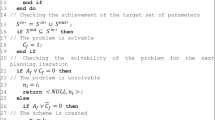Abstract
A novel methodology for high performance allocation of processors to tasks based on an extension of the rough sets to the novel rough grammar is presented. It combines effectively a global load balancing with a dynamic task scheduling on a multiprocessor machine. Our methodology does not require a priori knowledge about run times of tasks and prevents users from manual distribution of job tasks into available processors. The production rules are constructible from a concurrent program by a compiler. In order to control the flow of tasks and data the set of the rough grammar production rules is updated and rolled in a pipeline fashion through the multiprocessor net during job execution together with codes of the processes (tasks). This pipeline fashion of rolling the jobs defines the global job balancing. The rough grammar uses any operators and metrics inside its production rules (not only the concatenation). Therefore, it is active and capable of driving purposeful processing by demanding software and data on a multiprocessor (e.g., MIMD) system. Performance parameters for our dynamic management of tasks are derived and compared to a statically scheduled multiprocessor. Based on these parameters, our decentralized methodology is shown to attain a much higher performance level. For example, the speedup of the order of tenths is easily feasible for an arbitrary algorithm. Moreover, the fault tolerance is highly improved with our decentralized strategy. The production rules instantiated as a result of a distributed computation at a previous rough grammar graph level are kept as permanent checkpoints for the current computation level. More than one layer of permanent checkpoints is definable to increase the level of fault tolerance.
Access this chapter
Tax calculation will be finalised at checkout
Purchases are for personal use only
Preview
Unable to display preview. Download preview PDF.
Similar content being viewed by others
References
R. Bettati, J.W. Liu, “Algorithms for End-to-End Scheduling to Meet Deadlines”, Proc. 2nd IEEE Symp. on Parallel and Distributed Processing, Dallas, Texas, Dec. 1990, pp 62–67.
H.A. Choi, B. Narahari, “Scheduling Precedence Graphs to Minimize Total System Time in Partitionable Parallel Architectures”, Proc. 2nd IEEE Symp. on Parallel and Distributed Processing, Dallas, Texas, Dec. 1990, pp 402–406.
D.I.A. Cohen, Introduction to Computer Theory, Wiley, 1988.
E.W. Dijkstra, C.S. Scholten, “Termination detection for Diffusing Computation”, Inf. Process. Letters, 11, 1, Aug. 1980, pp 1–4.
M.J. Gonzalez, C.V. Ramamoorthy, “Parallel Process Execution in a Decentralized System”, IEEE Trans. C.mp., vol.c-21, No. 12, 1972, pp 1310–1322.
J.Ji, K. Jeng, “Bin Packing Adjustable Rectangles and Applications to Task Scheduling on Partitionable Parallel Computers”, Proc. 2nd IEEE Symp. on Parallel and Distributed Processing, Dallas, Texas, Dec. 1990, pp 312–315.
M.L. Mathews, “Hypercube software performance metrics”, in: Hypercube Multiprocessors, ed. M. T. Heath, SIAM, 1986, pp 155–160.
M. Minsky, S. Papert, “On some Associative Parallel and Analog Computations”, in: Associative Information Techniques, E.J.Jacks, ed., American Elsevier, 1971.
Z. Pawlak, “Rough Classification”, International Journal of Man-Machine Studies, 20, 1984, pp 469–483.
C.V. Ramamoorthy, M. J. Gonzalez, “A survey techniques for recognizing parallel processable streams in computer programs”, in: 1969 Fall Joint Comput. Conf., AFIPS Conf. Proc.,v.35, Montvale, N.J.: AFIPS Press, 1969, ppl-17.
G.C. Sih, E.A. Lee, “Dynamic-Level Scheduling for Heterogeneous Processor Networks”, Proc. 2nd IEEE Symp. on Parallel and Distributed Processing, Dallas, Texas, Dec. 1990, pp 42–49.
H. Sulivan, T.R. Bashkov, “A large scale homogeneous, fully distributed parallel machine, I”, Proc. Fourth Symp. on Comput. Arch., March 1977, pp 105–117.
W.I. Williams, “Load Balancing and Hypercubes: a preliminary look”, in: Hypercube Multiprocessors 1987, eds. M.T. Heath, SIAM, Philadelphia, 1987, pp 108–113.
Z.M. Wojcik, “Rough Approximation of Shapes in Pattern Recognition”, CVGIP, 40, 228–249, 1987.
Z.M. Wojcik, “The Rough Grammar for the Parallel Shape Coding”, Proc. ACM South Central Regional Conference, Tulsa, Nov. 1989, pp 84–90.
B.E. Wojcik, Z.M. Wojcik, “Sufficient Condition for a Communication Deadlock and Distributed Deadlock Detection”, IEEE Trans. on Software Eng., vol. 15, no. 12, Dec. 1989, pp 1587–1595.
Z.M. Wojcik, B.E. Wojcik, “Fault Tolerant Distributed Computing Using Atomic Send-Receive Checkpoints”, Proc. 2nd IEEE Symp. on Parallel and Distributed Processing, Dallas, Texas, Dec. 1990, pp 212–222.
Z.M. Wojcik, B.E. Wojcik, “A Rough Grammar for a Linguistic Recognition of Image Patches”, Signal Processing, 19, 1990, pp 119–138.
Z.M. Wojcik, “Rough Grammar for Efficient and Fault Tolerant Computing on a Distributed System”, IEEE Trans. Software Engineering,,July 1991.
Author information
Authors and Affiliations
Editor information
Editors and Affiliations
Rights and permissions
Copyright information
© 1992 Springer Science+Business Media Dordrecht
About this chapter
Cite this chapter
Wójcik, Z.M., Wójcik, B.E. (1992). Rough Grammar for High Performance Management of Processes on a Distributed System. In: Słowiński, R. (eds) Intelligent Decision Support. Theory and Decision Library, vol 11. Springer, Dordrecht. https://doi.org/10.1007/978-94-015-7975-9_25
Download citation
DOI: https://doi.org/10.1007/978-94-015-7975-9_25
Publisher Name: Springer, Dordrecht
Print ISBN: 978-90-481-4194-4
Online ISBN: 978-94-015-7975-9
eBook Packages: Springer Book Archive




